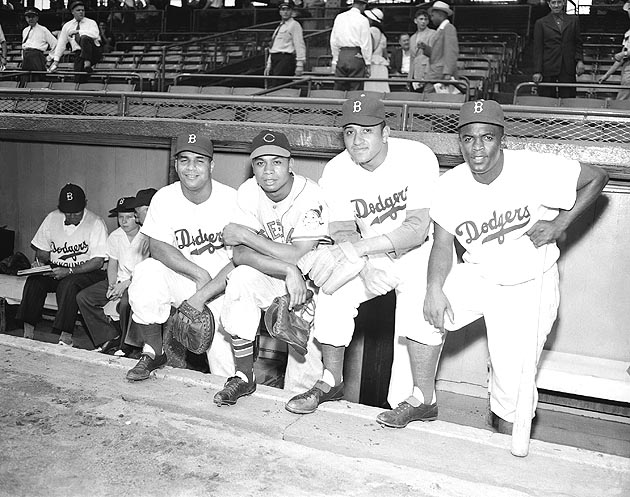
In 1997, 50 years after Jackie Robinson erased the modern-day color barrier, Major League Baseball retired his No. 42 across the sport. In 2004, the league named every April 15 to be Jackie Robinson Day. In 2011, every player wore No. 42 to honor Robinson, a tradition that continues.
Now that such observances have become indelible, and the film "42" has brought in $27.3 million to top the movie box office standings, what else is there to do, other than continuing to remember Robinson? One way is to do better at remembering who came after him.
Travis Reitsma, at Runs Batted Out, says MLB and the mainstream media lacks in this respect:
For one, although Robinson was the first black player to play in the Major Leagues post-segregation, forgotten are the scads of black players who played professional top-tier baseball pre-segregation and how many of them faced the same criticism (and even worse, in some cases) as Robinson did. There’s also the fact that mere days after Robinson made the jump to the Majors, many other black players followed, such as Larry Doby of the Clevelands and Dan Bankhead, a pitcher who played alongside Robinson on the Dodgers. Although Robinson was certainly more of a star than either of those two players, their complete lack of mention when talking about the integration of Major League Baseball is sort of appalling.
Robinson wasn't the first black to play baseball — that was Moses Fleetwood Walker in 1884 — but he was the first to stay, the first of an irreversible wave that changed the game forever. It only would enhance Robinson's legacy if Doby and others became more of a part of the "42" celebrations. That was the point, after all; Robinson made it so anyone qualified could play Major League Baseball.
This is not to say that all teams should retire Larry Doby's number, or that we need a "Dan Bankead Day." We just need to do a better job of keeping them in mind.
In his blog post, Reitsma also makes a larger point — an opinion I genuinely share — that Robinson probably was the greatest civil rights figure in U.S. history. The barriers he and others faced even after Robinson joined the Brooklyn Dodgers were shamefully real and appalling. Robinson getting to play wasn't only about baseball, it was about a beginning of true equality in American life — something we're still searching for. Hopefully in the spirit of those on the front lines.
Baseball is back! Interact with @AnswerDave, @MikeOz, @Townie813 and @bigleaguestew on Twitter, along with the BLS Facebook page!
No comments:
Post a Comment